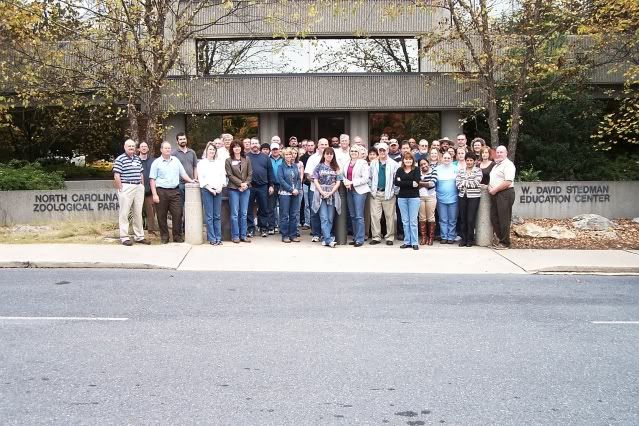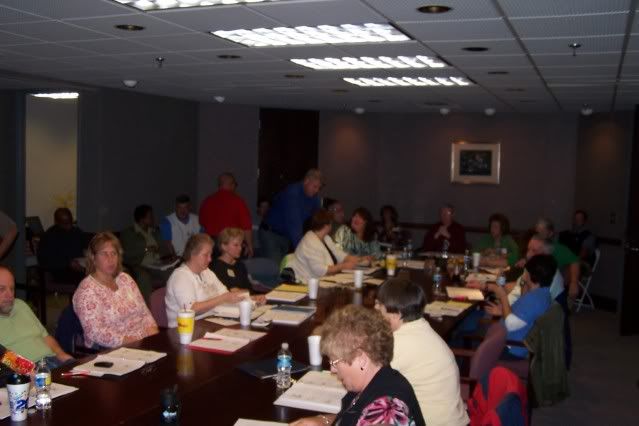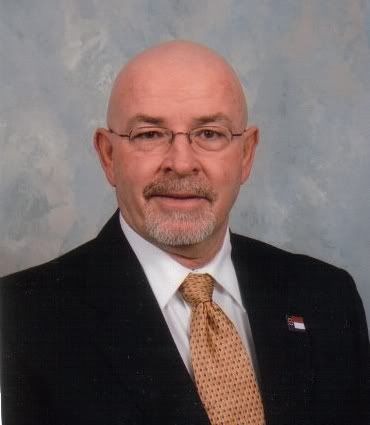Happy
Thanksgiving Friends in the Name of
Safety:
Safety Section UPDATE: December
1, 2009 begins a new era for your Safety
section with the
Legislative Mandated Fee Schedule.
As we move into this new era, we look
forward to the challenge and pledge to
continue to provide quality training and
services to our clients. Please give us
a call to schedule your safety training
classes early. Thanks again for your
continued support!
New N.C. Industrial Commission Web Page:
We have a new look! Please visit
our brand new Web Page. To checkout the
Safety Education Page... View and Save
as as FAVORITE by
CLICKING HERE
Be on the lookout for Workshops &
Seminars coming soon!
80th Statewide Safety
Conference!
Mark your
calendar now for
May
11-14, 2010! Eighty Years of Safety and
Counting...
|
Regional Safety Councils

Please... don't forget to support
your Regional Safety Councils by
joining their membership ranks and
participating in their scheduled
events. For membership
applications, see the Quick Links to
the right.
|
Please don't forget...
NCIC Video Library is
Closing
Due to recent budget
requirements, we will
discontinue our video library on
December 1, 2009.
At this time, we are not sure if
this will be permanent or short
term. Once a decision has been
made, we will inform you.
We apologize for any
inconvenience.
|
Give Yourself a Hand!
 Protect your hands on the job
Protect your hands on the job
We use our hands so constantly that
we take them for granted.
Unfortunately, because we take them
for granted, hands and fingers are
among the most frequently injured
parts of the body. The
National Safety Council reports
that in a recent year there were
530,000 disabling hand and finger
injuries.
Most
hand and finger injuries fall into
these categories:
-
Traumatic injuries
range from cuts and
punctures to broken
bones to amputation.
Many cuts or punctures
are minor, but if they
go through the skin they
can sever nerves,
tendons, or ligaments.
They can also get
infected.
-
Contact injuries
are usually skin
diseases or burns that
can result from direct
contact with hot or cold
objects, or with
chemicals, detergents,
or metals.
-
Dermatitis.
Symptoms like swelling,
itching, rash, burning,
or blisters can be bad
enough to make it
impossible for you to
work. Dermatitis often
shows up immediately
after contact with a
chemical, but sometimes
it takes a while to
develop an allergic-type
reaction. Once you have
this kind of
sensitization, you
usually can't get near
that chemical again.
Follow these safety basics to
protect your hands:
-
Follow manufacturer's
and employer's
instructions for using
tools and equipment.
- Feed
materials into moving
machinery with a push
stick, not your hands.
- Keep
your hands away from
moving machine parts.
-
Always cut away from
your body.
- Store
tools so no sharp edges
are exposed.
- Use
brushes, not hands, to
sweep up metal or wood
chips.
- Check
materials for sharp
edges, burrs, splinters,
etc., before handling
them.
- Make
sure you know how hot or
cold an object is before
handling it.
- Wipe
off greasy or slippery
objects before handling
them.
- Lift
an object so your hands
are not near the pinch
points.
- Put
materials down carefully
so you don't mash your
fingers.
- Use
the right tool for the
job and use it
correctly.
- Pass
tools to other workers,
handle first. Never
throw tools.
|
|
Hot Rocks!
 By
Michael Nance By
Michael Nance
I love music but I am not
referring to the "Hot Rocks" album by
the Rolling Stones (though it's a great
album) nor am I referring to those hot
stones that are used in massage
therapy. I'm talking about your
standard, run of the mill rock.
My wife is the co-chair of the youth
leadership team for our church. She is
in charge of coming up with (hopefully)
interesting and thought provoking
discussions and activities for 6th
through 12th grade aged youth. This can
be a challenge since there is a wide age
range so the group is divided into
middle school and high school age
groups. Some topics are toned down just
a bit for some of the younger children.
She researches a topic, gets other
volunteers to help in the break-out
groups, organizes the music, etc.
relevant to the age.
For the most part she does this
throughout the week in addition to the
other "teacher work" she does at home
(she is a high school teacher). We both
bounce things off each other to see if
it will work, and in my case, for
grammar and perhaps the flow. This past
week her topic was on "burdens". That's
something we all have whether you're 3
years old or approaching 100. Some
burdens are small and somewhat minor
while others are so massive that
professional help should be called in.
In this same wavelength, what is minor
to one person may be huge to another.
We come from different backgrounds,
financial means, ages, i.e. losing a $5
bill for one person may mean the
difference of not eating dinner and
being hungry while to another, it's not
that big a deal. Even though this topic
was used in a church setting, it can be
molded into a neat little safety
attitude or team building exercise. Let
me illustrate the group activity and see
what you think.
The guideline for gathering the
materials for my wife's youth exercise
was to simply (tell me to get) a bag of
rocks. Everyone was supposed to sit in
a circle; this could be around a
campfire, or in a large room. Without
stating what the overall purpose was,
each person was to reach inside the bag
and pull out a rock and just hold it as
the bag was passed. Once everyone had a
rock, the facilitator explained that the
rock represents a burden you may have.
One by one, each person would describe
their burden. It was explained that you
could state a burden of someone you
know, i.e. family member, neighbor,
co-worker, etc. No one was to put on
the spot.
When my wife explained what she wanted
to do with the youth group, I sat for
about an hour watching the college
football games. For some reason, as
hard as I tried, I couldn't let it out
of my mind and I finally turned the TV
off (actually, after years of marriage
it's become a "rule" that when she
speaks to me, the TV must be turned
off). I get into trouble for trying to
listen and watch at the same time,
especially when "quizzed" about what she
just said and I don't know. After a
brief discussion, my thoughts began to
drift towards the workplaces that I have
been to over the years. During most
safety training sessions, I hear about
the burdens that a person (or group)
has. Sometimes it affects the safety
culture of a company's safety program.
One of the common burdens felt by
employees is, "management doesn't listen
to us". Not unlike my wife telling me
that I don't listen to her. Have you
ever reached for an apple in the fruit
bowl only to find out that it's got a
bad place on it? Do you throw the whole
apple away? Probably not, you just
carve out the bad area and enjoy the
rest. Just like that apple, some of our
co-workers might have a "bad place"
attitude. As a safety or risk manager,
part of our job is to get the bad carved
out. It's a challenge in many cases
because it's a burden on the rest of the
positives. Getting a person to open up
about how they feel can help resolve or
eliminate burdens. Of course, you don't
want to open up a can of worms like
having safety meetings on a particular
topic migrate into a pay complaint
meeting. Having employee meetings is a
way of letting questions be answered or
a venue to express complaints, but they
must be controlled. Usually I try to
turn the tables and tell the person with
the complaint to come up with a few
solutions and present them at the next
meeting. I don't blow it off. I listen
and promise to find out a reason as
well. During their research, they
quickly realize the burdens management
often has. On a personal note, unless
it's written down, I'm apt to forget the
details. If the score of the game is
tight, my attention is not focused on
what my wife is instructing me to do
after the game. I have gone to pick up
my son from someone's house only to show
up at the wrong house and I was supposed
to get my daughter instead. I've also
not properly listened to my wife's
laundry instructions and added bleach to
the load containing her new (let me
repeat "new") blouse. I actually was
able to return to the store, explain
that there must have been something
wrong with it, get it exchanged and
returned home, thinking I wouldn't get
caught. Hmmm, forgot it would show on
the billing statement. Curses again!
Years ago, I had an employee complain
about a problem and when I told him the
dry company standard answer, he wasn't
happy. Then, after he calmed down, I
told him the personal one-on-one
answer. Still, he had smoke coming from
his ears but about three hours later, he
called me back. He stated he wanted to
apologize for his language and to
express his thanks for simply being
personal and truthful. That's all he
really wanted, the truth. I had lifted
a festering burden once he carved away
the bad. Safety regulations and
policies are sometimes considered a
burden for some but once they know the
true reason, (the what, how, why) there
is usually a change of attitude for the
better. The fewer burdens, the better
the safety culture is and in turn, the
better the company operates.
Getting back to the rocks, I'd like to
further share my experience. I thought
for several hours about her topic for
the youth. When it came time (after
this particular football game) to gather
the rocks, I decided to get small and
large ones, smooth and rough ones, dark
and light colored ones, pretty and ugly
ones. Without explaining, the youth
would draw out one rock and pass the bag
of rocks. Knowing that various rocks
would be pulled out and after everyone
had "theirs", it was explained that we
all have different burdens and these
rocks are a symbol of that burden. Some
are large, some are small. Some can be
smoothed over fairly quickly while
others might take years to smooth or
eliminate. As the group shared a burden
(whether their own or not), it was
quickly realize by all that they were
not alone with issues and problems.
Some became overcome with emotion and
were able to release for the first time
a bad part of their apple.
Perhaps this might be a corny hands-on
activity for an employee meeting,
perhaps not. In our Advanced APCAP
recently held in Asheboro, several of us
got to talking about the "corny stuff"
during the breaks. All of us agreed
that sometimes that's the best way to
reach or convey a safety message. Folks
remember the corny over the suit and tie
method most of the time. I'd like to
insert a plug here for our APCAP's soon
to be released schedule. After every
session, the safety staff will truly
review the critique forms and
tweak/revise our topics. Over the
years, we get an overwhelming positive
response that they found something new
to take back into the workplace. The
networking and the relaxed atmosphere is
a bonus too. Finding corny ways of
developing a discussion can be talked
about for days or months. It can get
employees to realize the burdens a
co-worker has in the course of their
daily routine. It could help employees
understand why a company makes the
decisions it has to make. Sometimes
those decisions are not popular but by
being truthful, we can transform those
rough rocks into smooth ones. We can
cool down the hot attitudes, eliminate
our "Hot Rocks" and focus on a positive
safety culture.
Editor's note: Michael Nance is the
NCIC Blue Ridge, Southern & Western
Piedmont areas Safety
Representative. If you are
interested in having one of our
programs in your area, please give
Michael a call at 919-218-9047 or
email him at
Michael.Nance@ic.nc.gov
|
Diabetes Is on the Rise ...
And many Americans don't know they have
it
November
is American Diabetes Month, a
perfect time to get more informed about
this disease, in which the body either
doesn't produce insulin or doesn't
recognize it. Insulin is a hormone that
helps convert sugar, starches, and other
foods into energy. Most people who have
diabetes have other problems, such as
being overweight, having high blood
pressure, or having high cholesterol.
Hence, people with diabetes are
generally at risk of developing heart
disease or stroke.
The American Diabetes Association (www.diabetes.org)
says that 54 million Americans have
pre-diabetes-and many don't know it. The
good news is that once they find out,
they can make lifestyle changes to delay
or prevent diabetes.
What You
Can Do
First, find out if you are at risk for
developing diabetes by taking the
diabetes risk assessment under news &
notes. Also ask your health professional
about having a fasting plasma glucose
test or an oral glucose tolerance test.
If you are diagnosed with pre-diabetes,
take these steps:
- Get
moderate exercise 30 minutes
5 days a week.
- Lose 5
percent to 7 percent of your
weight if you are
overweight.
Eat low-calorie,
low-fat foods.
Visit the National Diabetes
Education Program's (NDEP) Small
Steps, Big Rewards, Prevent Type
2 Diabetes
website for more details.
Now you know. Dennis :)
|
Insight!?
Fun and useless tidbits

-
A Crocodiles tongue is attached to
the roof of its mouth.
- A group of larks
is called an exaltation.
- Canada is an
Indian word meaning Big Village.
- Catgut comes from
sheep not cats.
- Cats have over
one hundred vocal sounds, while dogs
only have about 10.
- Chrysler built
B29's that bombed Japan. Mitsubishi
built the Zeros that tried to shoot
them down. Both companies now build
cars in a joint plant called Diamond
Star.
- Due to
gravitational effects, you weigh
slightly less when the moon is
directly over head.
|
No
Problem?
Test your problem-solving skills
Learning to solve problems promptly and
effectively is one of the most important
skills you can have. Find out how sharp
your problem-solving skills are by
taking this quiz.
1.
The first step in the
problem-solving process is to
prioritize problems.
a. True b. False
2.
When you face an unfamiliar
problem on the job:
a. Go online to find an answer.
b. Talk to a more experienced
co-worker.
c. Talk to your supervisor.
3.
When you are searching for a
solution, ask:
a. True/false questions
b. Either/or questions
c. "What if" questions
4. Insufficient information
about a problem leads to an
inadequate solution.
a. True b. False
5. Once you've implemented a
solution, the problem-solving
process is complete.
a. True b. False
Answers at end of Safety
Bulletin.
|
 Avoid
Work Wars Avoid
Work Wars
Good communication keeps the peace
One of the best ways to
minimize workplace conflict is to
communicate effectively. Good
communication means sending clear
messages and listening to co-workers
until you receive their intended
messages.
Send
Clear Messages
- Know what
you want to say before you
speak.
- Use
first-person statements,
such as "I think," "I
believe," and "I need," to
take responsibility for your
position.
- Avoid
making accusatory
statements, such as "You
always do that," "You never
follow through," "The
trouble with you is..." That
may be how you see the
issue, but there may be more
involved than you know
about, and these statements
only exacerbate the
situation.
- Tell the
truth as you see it, simply
and professionally.
- Provide
complete information. Tell
who, what, when, where, and
how.
- Use
positive statements, such as
"I think it would be good if
we could," instead of
negative statements, such as
"How come you don't?" or
"Why can't you?" Also, using
"we" implies that you are on
the same team and not an
individual accusing another
individual.
- Avoid
judging, criticizing,
name-calling, diagnosing,
patronizing, ordering,
threatening, moralizing, or
dismissing the other
person's concerns.
Receive
Intended Messages
-
Don't interrupt. Give
others the time they need to
say what they have to say.
-
Pay attention to what they
say. Don't prepare
your response until they
finish.
-
Be open and receptive.
Don't jump to
conclusions or make
assumptions. Focus on
issues, not personalities.
-
Look for nonverbal messages,
such as expressions,
gestures, tone of voice, and
body posture.
-
Use your own non-verbal
messages, such as eye
contact, body posture, and
gestures to show that you
are listening.
-
Put yourself in the
other person's shoes to
understand his or her point
of view.
-
Ask questions to
clarify points you don't
understand.
-
Paraphrase to ensure
that you both agree on what
was said.
|
 WINTER
WONDERLAND WINTER
WONDERLAND
... or
winter hazard trap?
Winter Hazard Awareness Week is held
every November to remind Americans to
follow winter safety tips. For example,
preventing slips and falls is a major
concern when outdoor surfaces are wet or
icy and slippery under foot.
Take these steps to keep your steps
secure in slippery conditions:
- Wear
appropriate footwear with
nonslip soles on wet, icy,
or snowy days.
- Take
extra care when walking on
wet, icy, or snow-covered
walkways. Walk slowly and
slide your feet on slippery
surfaces. Avoid turning
sharply when on a slippery
surface.
- Hold onto
the railing when using
outdoor stairways.
- Be
especially careful when
carrying packages,
equipment, and materials.
- Wipe your
feet when entering a
building so that your wet
soles won't cause you to
slip on indoor flooring.
- Limit
your injuries if you slip
and start to fall by bending
your elbows and knees and
using your legs and arms to
absorb the fall. Or roll
into the fall, if that's
more appropriate.
|
Welcome to our Two Most Recent
APCAP Graduating Classes, Basic &
Advanced!

NC Zoo Basic APCAP Gradutaing
Class!

NC Zoo Advanced APCAP Graduating
Class!
We had a
great time networking and
exploring safety during our
last 2009 Accident
Prevention Certificate
Awareness Program (APCAP)
October 26-30, 2009 at the
NC Zoo. We look forward to
our 2010 schedule to be
posted in December.
Remember, there will be a
minimum fee for this course
in the future. $125 per
person for the Basic 4.5 day
course and $75 per person
for the two-day course. Stay
tuned for more soon... Have
a great Thanksgiving!
|

Prevention Is the Cure
10 ways to prevent workplace
violence
One-sixth of violent crimes occur in
the workplace-nearly 2 million
incidents a year.
Our intention in telling you this is
not to scare you, but rather to
encourage you to be alert and take
these steps:
-
Follow the company's
security procedures and
use its security
systems.
-
Report any unauthorized
strangers to Security,
including people
loitering in parking
areas or outside the
building.
- Make
sure visitors are met in
the lobby and escorted
to their destination.
- Send
strange or unexpected
packages or letters to
Security. Don't open
them or shake them.
- Guard
all security
information, access
codes, keys, etc.
-
Arrange a danger signal
or code phrase to alert
co-workers to trouble.
- Take
threats and harassment
seriously; report them
to your supervisor.
- Let
someone know when you
are working late and
stay near a phone.
-
Report security
problems, such as
burned-out lights,
broken locks, and
malfunctioning security
systems, etc.
- Be a
defensive driver when
commuting and take
travel precautions when
on a business trip.
|
What Folks Are Saying...
Dennis, as always a great class, great
bunch of guys you work with! You are so
lucky. It was so nice meeting all of you
and I hope we can get together again
some time.
Thanks for the class.
Carol S. Cockerham
Rural Hall, NC
******************
Dennis - We really appreciate the
services you have provided to us! You
all were the uplift I needed for two
days, very informative, and provided new
tools for the safety world that I knew
nothing about. I am trying to grow the
safety program for the zoo at the moment
and it was most useful. Thank you for
all you do. All presenters were
outstanding!!!
Cami Bunting
HR Officer
NC Zoo
******************
Dennis,
Thanks for the great week of
Safety Training recently at the
N.C. Zoo. Ya'll do a fantastic
job and we appreciate it.
As a retired Highway Patrolman
with 30 years of service I was
very pleased with Mel Harmon's
presentation on Defensive
Driving. I have had many
opportunities to have training
in Defensive Driving measures
during my career with The N.C.
Highway Patrol and I have never
heard a better version than what
Mel did. Thanks again for all
ya'll do in the interest of
safety. Please keep up the good
work.
Ron Williams
Randolph County Safety &
Training
|

Physicians Not Always Aware
of
Women's Heart Disease Risk
A survey sponsored by the
American Heart Association
and KOS Pharmaceuticals
showed that doctors have low
levels of awareness of
cardiovascular risks in
women and may under treat
those risk factors.
An article regarding the
findings appeared in the
October 26 issue of the
Archives of Internal
Medicine. The research was
conducted by scientists at a
German university.
Heart attack risk factors
and heart attack prevalence
among more than 8,000 women
ages 35 to 54 were reviewed
over two periods, each
lasting several years.
The results showed that
factors like total
cholesterol level, blood
pressure, and smoking status
were stable among men but
worsened among women. The
only factor that improved in
women was HDL, or "good"
cholesterol level.
The study also showed that
while men had more heart
attacks than women in the
same age group during both
periods, the gap narrowed in
recent years as heart attack
prevalence increased among
women.
The scientists suggest the
need for intensification of
screening and treatment of
vascular risk factors in
middle-aged women.
|
|
Barbara Cassidy is the First
Recipient of the Director's Award
Barbara Cassidy, CPSC newly
elected Chair, is our first recipient of
the N.C. Industrial Commission Safety
Education Director's Award.
This award was created this year to
honor the person exhibiting service to
the Safety Education Section above and
beyond the call of duty.
Thank you Barbara!
|
|
Answers:
(1) b. The first step is to identify
and define the problem.
(2) c. Talk to your supervisor.
(3) c. "What if" questions generate
possible solutions to problems.
(4) a. True.
(5) b. You need to make sure your
solution has solved the problem.
|
Greg
Scheafer Takes the Helm of Southeastern
Safety Council

Greg was born St. Louis
Missouri, moved to NC after joining the
Army and being station at Fort Bragg.
He worked in the US Army for 22 years,
doing jobs as a Cavalry Scout, Military
Intelligence, Computer Repair, Secure
Voice Systems Manager and Safety
Officer. After the Army Greg worked for
UPS as a Health and Safety Supervisor
for 4 years and then as District Risk
Manager for 3 years.
He left UPS in 2007 and accepted a
position as the Safety Officer for the
City of Fayetteville, NC. Greg says. "I
am married to a wonderful Carolina Girl;
we are celebrating 30 years of marriage
in January." They have three beautiful
daughters, one is married to a solider,
one IS
a soldier and the other one is still at
home-thinking of becoming a nurse. Greg
enjoy outdoor activities like hunting,
fishing, scuba diving, skiing and golf.
He also enjoys spending time at the
beach and taking cruises with his
family.
To contact Greg, you may
either Email
him or call at 910-433-1724.
We would like to say a
BIG Thank You to outgoing Chairman,
Gregg Warren! Thanks for all of your
dedication and long hours to SESC for
the past 3 plus years!!!
Mr. Warren will continue
serving the Southeastern Safety Council
in the capacity of Secretary.
|
|
About N.C. Industrial Commission
Safety Section
The N.C. Industrial
Commission Safety Education Section
stands ready to assist you with your
Safety training needs. We offer a
variety of courses, designed to suit
your needs. Please give one of our
Industrial Safety Representatives a
call.
 DENNIS
PARNELL DENNIS
PARNELL
Director Safety Education
919-218-3000-Cell
919-807-2602
Dennis.Parnell@ic.nc.gov
 KIM
NADEAU
Program Assistant
919-807-2603
Kim.Nadeau@ic.nc.gov
 RANDY
CRANFILL RANDY
CRANFILL
Western Carolina Area & APCAP & APW
Coordinator
919-218-2986
Randy.Cranfill@ic.nc.gov
 ALVIN
SCOTT ALVIN
SCOTT
Eastern & Northeastern Areas, Eastern
Defensive Driving Instructor
919-218-2792
Alvin.Scott@ic.nc.gov
WE ARE
STILL WORKING FOR YOU!
|
|
|
|
Quick Links
General
Industry
|
|
Quick Links
Fleet Safety
Right Turn...Left Turn
|
|
Quick Links
CENTRAL
PIEDMONT SAFETY COUNCIL
Membership Brochure
|
|
Quick Links
EASTERN
CAROLINA SAFETY COUNCIL
Membership Brochure
|
|
Quick Links
SOUTHEASTERN SAFETY COUNCIL
Membership Brochure
|
|
Quick Links
WESTERN PIEDMONT SAFETY COUNCIL
Membership Brochure
|
|
Quick Links
MID-STATE
SAFETY COUNCIL
Membership Brochure
|
|
Quick Links
BLUE RIDGE SAFETY COUNCIL
Membership Brochure
More About Us |
|
Quick Links
NORTHEASTERN SAFETY COUNCIL
Membership Brochure
|
|
Quick Links
WESTERN CAROLINA SAFETY COUNCIL
Membership Brochure
|
|
Quick Links
NC RURAL WATER ASSOCIATION
|
|
Quick Links
SIGN-UP FOR OUR NCIC
SAFETY BULLETIN
Email/Newsletter
|
|
Quick Links
news & notes
HAND IN
GLOVE
Get a good fit and choose the right
glove.
- Wear insulated or
leather gloves for heat and
cold. Fabric should be
fire-retardant for open
flame, reflective for
radiant heat.
- Wear insulated rubber
gloves for electricity.
- Wear metal mesh or other
cut-resistant gloves to
handle sharp objects.
- Wear leather gloves for
rough surfaces.
- Wear fabric gloves for
slippery objects.
- Wear neoprene or nitrile
rubber gloves for
corrosives.
- Check the MSDS to select
gloves for working with
chemicals.
- Consider hand pads for
heat, roughness, and
splinters.
- Use thumb or finger
guards or tapes on dangerous
jobs.
- Use long cuffs,
wristlets, or duct tape to
keep chemicals or heat out
of gloves.
- Use barrier creams
to protect the skin when
gloves aren't practical.
CHEMICAL-PROTECTIVE GLOVE CARE
- Bandage cuts or scrapes
before putting on gloves.
- Rinse gloves before
removing them.
- Clean gloves before
storing them.
- Store gloves in a cool,
dark, dry place, right-side
out, with cuffs unfolded.
- Wash hands with soap and
water or skin cleanser after
handling chemicals.
And help is just a phone call
away.
Call your
NCIC
AREA SAFETY CONSULTANT!
|
|
Quick Links
CAUSES
OF WORKPLACE CONFLICT
Here are several potential causes of
workplace conflict:
- Poor communication leads to
misunderstandings, which often lead to
conflict.
Dissimilar work styles may cause
co-workers to come into conflict when
each one thinks his or her way is
"right."
- Different personalities will
sometimes clash on the job.
- Different goals can also lead to
conflict. Some people may think their
objectives are more important than those
of their co-workers. They may believe
their goals deserve priority, or they
may simply not understand their
co-workers' goals.
- Different needs are another common
cause of workplace conflict. Co-workers
may compete for resources, recognition,
raises, promotions, and so forth.
- Different functions may cause
conflicts. Where co-workers' functions
overlap or come into contact,
territorial disputes may arise or
competing interests may conflict.
- Different perceptions People may
have differing viewpoints of situations,
policies, and so forth, which can lead
to disagreements about what should be
done and how it should be done.
- Pressure to achieve results,
maintain schedules, and so on, can often
lead to confrontations.
Give us a call...
|
AMERICAN DIABETES MONTH
Help your
kids develop good habits and lower their
risk for diabetes by letting them use the
Centers for Disease Control and Prevention's
(CDC) interactive website for children
called
"The Eagle's Nest"
|
|
Quick Links
HELP
CO-WORKERS QUIT SMOKING!
If you have co-workers who are trying to kick
the habit during the Great American Smokeout
this November, do what you can to help. Here's
why:
- You'll improve your own health.
The 2006 U.S. Surgeon General's
report, Secondhand Smoke: What it
Means to You, states that secondhand
smoke can use lung cancer, heart
disease, and elevated cholesterol
levels.
- You'll improve working
conditions. New nonsmokers won't be
absent as much because of
smoking-related illnesses. And when
on the job, they won't be taking
smoking breaks.
How can you help
a co-worker quit?
- Cheerlead the decision to quit.
- Be patient if they're irritable.
- Allow them to vent their
frustrations. Don't take it
personally.
- Be available to spend time with
them in smoke-free environments.
- Invite them to smoke-free
activities, such as mini-golf or a
movie, to help them keep busy.
|
|
Quick Links
Here's an extra incentive to kick the habit this
year:
- Did you know that there are more
than 4,000 chemicals in cigarette smoke?
Some of the same chemicals are also in
wood varnish, arsenic, nail polish
remover, and rat poison.
Here
are other good reasons to quit:
-
You'll feel healthier right away,
and you'll be healthier for the rest of
your life, which will probably be longer
because you quit smoking.
-
You'll have more energy and
better focus.
-
You'll have a better sense of
smell and taste.
-
You'll have whiter teeth and
fresher breath.
- You'll
cough less and breathe better.
-
You'll lower your risk for
cancer, heart attack, strokes, early
death, cataracts, and skin wrinkling.
- You'll
feel more in control of your life.
-
You'll have more money. Add
the money you spent on cigarettes
last year. Multiply that by the
years you've smoked. What could you
have bought with all that money gone
up in smoke?
- You
won't have to worry about when
you'll get to smoke next or what to do
when you're in a smoke-free place.
|
|